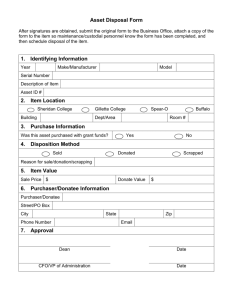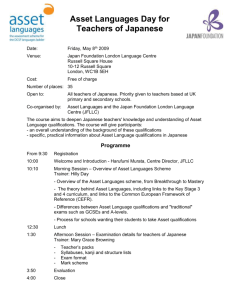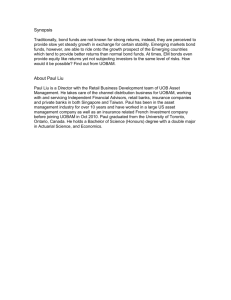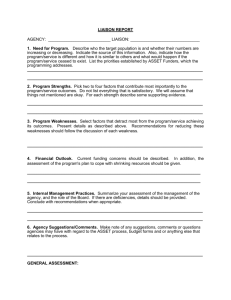ASSET LANGUAGES - Southend High School for Girls
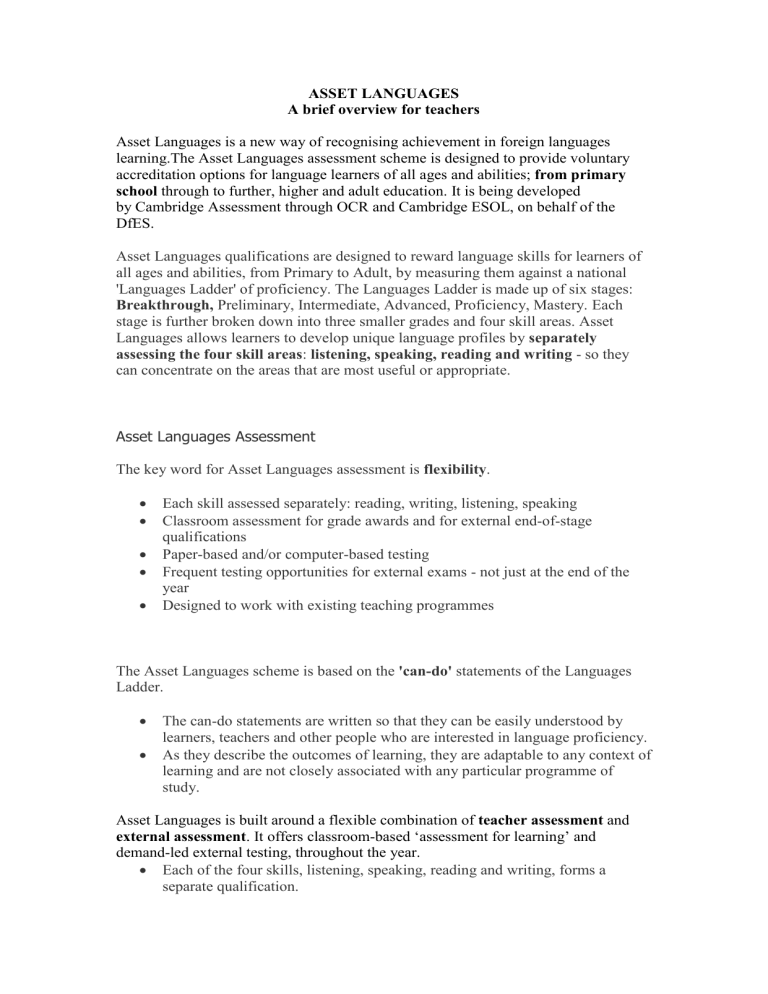
ASSET LANGUAGES
A brief overview for teachers
Asset Languages is a new way of recognising achievement in foreign languages learning.The Asset Languages assessment scheme is designed to provide voluntary accreditation options for language learners of all ages and abilities; from primary school through to further, higher and adult education. It is being developed by Cambridge Assessment through OCR and Cambridge ESOL, on behalf of the
DfES.
Asset Languages qualifications are designed to reward language skills for learners of all ages and abilities, from Primary to Adult, by measuring them against a national
'Languages Ladder' of proficiency. The Languages Ladder is made up of six stages:
Breakthrough, Preliminary, Intermediate, Advanced, Proficiency, Mastery. Each stage is further broken down into three smaller grades and four skill areas. Asset
Languages allows learners to develop unique language profiles by separately assessing the four skill areas : listening, speaking, reading and writing - so they can concentrate on the areas that are most useful or appropriate.
Asset Languages Assessment
The key word for Asset Languages assessment is flexibility .
Each skill assessed separately: reading, writing, listening, speaking
Classroom assessment for grade awards and for external end-of-stage qualifications
Paper-based and/or computer-based testing
Frequent testing opportunities for external exams - not just at the end of the year
Designed to work with existing teaching programmes
The Asset Languages scheme is based on the 'can-do' statements of the Languages
Ladder.
The can-do statements are written so that they can be easily understood by learners, teachers and other people who are interested in language proficiency.
As they describe the outcomes of learning, they are adaptable to any context of learning and are not closely associated with any particular programme of study.
Asset Languages is built around a flexible combination of teacher assessment and external assessment . It offers classroom-based ‘assessment for learning’ and demand-led external testing, throughout the year.
Each of the four skills, listening, speaking, reading and writing, forms a separate qualification.
Learners may take the teacher assessment for each skill at each grade and are then eligible for a Grade Award issued in the centre by their Accredited
Teacher.
Learners receive an accredited OCR qualification for a particular stage and skill once they have taken the appropriate external assessment. This takes the shape of one test that covers all three grades in the stage, for example,
French Intermediate Reading.
Teacher assessment carried out using material – tasks and mark schemes – that is supplied by OCR in a Teacher Assessment Pack and marked by an Accredited
Teacher in the centre. It is designed to be part of the programme of work for candidates and leads to a Grade Award.
Since it does not involve external assessment, a Grade Award cannot be regarded as a formal qualification within the National
Qualifications Framework.
External assessment : At any point in the year, when the learner is ready, they can be entered for an Asset Languages qualification. The external assessment covers the whole of a stage (all three 'grades'). As with the teacher-assessed awards, the external assessment is offered for all four skills separately and each external skill test successfully completed is a qualification in its own right - eg Breakthrough French
Reading. External assessment in reading, writing and listening is work that is set and marked by OCR. External assessment is carried out under controlled conditions but it is expected that most external assessment will take place within the normal classroom environment.
ASSET LANGUAGES
A brief overview for Centres
If you choose to register with us to offer Asset Languages qualifications, you will be sent detailed information and support materials for the scheme and given a place on a free training course for your Centre Coordinator .
If you are planning to run the teacher assessment element of the Asset Languages scheme, please also look at the information in the Teachers' section of this site, which includes details about the role of the Accredited Teacher.
How a Centre is structured
The Head of Centre
The Head of Centre is the most senior officer in the organisation, eg the Headteacher.
The Centre Coordinator
The Centre Coordinator is the person who has a detailed understanding of the workings of the Asset Languages scheme.
Centre Coordinators liaise between the languages team in the centre and the
Examinations Officer They also coordinate teacher assessment and Accredited
Teachers .
In primary schools, this role will probably be filled by the Languages Coordinator.
OCR offers free training to Centre Coordinators .
The Accredited Teacher/s
For each language and stage offered via teacher assessment, the centre must have at least one Accredited Teacher, who is responsible for ensuring that the standards of teacher assessment are maintained. It is expected that Accredited Teachers will normally work in the centre but this is not a requirement. For example, a primary school could have teacher assessment overseen by an Accredited
Teacher from a local secondary school .
The Examinations Officer
The Examinations Officer is the person appointed by the Head of Centre to administer the external tests. OCR corresponds formally with the Examinations Officer in this regard. Secondary schools and colleges will have designated Examinations Officers.
In primary schools this will probably be the person who administers the KS2 tests, or it could be the Languages Coordinator.
Working in Partnership with Other Centres
Parent centres
This model is ideally suited to a group of schools that wishes to share the administration for Asset Languages, e.g. a secondary school and its primary feeder schools that share resources for language teaching. The model has two options, allowing candidates either to sit for Asset Languages External Assessments at their own centre or at the parent centre.
Fees and Finances
Basic cost information:
Initial registration and the mandatory Centre Coordinator course are free .
Teacher accreditation is also free for one teacher per language per stage. There is a small charge of between £25 and £35 for additional teachers.
Other costs depend on the stage and context and the way in which the qualification is used.
For teacher assessment the minimum purchase is a pack of photocopiable masters, which provides good value, since it covers a whole stage and can be reused again and again for several year groups.
Teacher assessment can be enhanced through the use of high-quality certificates, sold in packs at a cost of a few pence per certificate.
For external assessment the total cost of entering all four skills is comparable with a corresponding GCSE or Entry Level qualification.
ASSET LANGUAGES
FEES FOR PRIMARY CENTRES
September 2005
The following introductory fees for Asset Languages will be held until at least
December 2005.
All prices listed include VAT where applicable, with the exception of certificate packs.
To offer Asset Languages qualifications, you must be a registered centre.
You can register online at www.assetlanguages.org.uk
or call
01223 553998.
Centre registration
Free of charge
Centre Coordinator training
Free to one Centre Coordinator per Centre.
Teacher Accreditation / Speaking Assessor Accreditation
Free of charge to teachers for one teacher per language per stage per centre.
Additional teachers will be invoiced for the full fee.
Breakthrough Stage £25 per teacher
Preliminary Stage
£30 per teacher
Teacher Assessment Packs
A Teacher Assessment (TA) Pack will be for a specific language, stage and context e.g. French Breakthrough.
The ring bound pack includes
guidelines
basic assessment materials
reporting forms
40 certificates worth £25.
Primary Context
TA Pack (Breakthrough)
£70
TA Pack (Preliminary)
£80
Certificate Packs
Pack A 40 certificates
£25 +VAT
(equivalent to 62.5p
+VAT
per certificate)
Pack B 125 certificates £50 +VAT (equivalent to 40p +VAT per certificate)
Pack C 400 certificates
£100 +VAT
(equivalent to 25p
+VAT
per certificate)
External assessment
Entry fees are for each individual skill. Fees will be charged at one of two rates, depending on whether they are received before or after the published deadlines.
Entries received before the deadline
Breakthrough Stage
£1 per skill
Preliminary Stage
£1per skill
Entries received after the deadline
Breakthrough Stage
£2 per skill
Preliminary Stage
£2 per skill
New entries for an assessment will not normally be accepted more than two weeks after the published deadline for a session. However it will still be possible to add (or withdraw) candidate entries for assessments already entered. Such entries will be charged at the higher of the two rates.
Contact Information
For enquiries relating to Asset Languages qualifications please contact the OCR
Information Bureau on:
Telephone: 01223 553998 (8:00 –5:30 Mon–Fri)
Fax: 01223 552627
Email: assetlanguages@ocr.org.uk
(please include centre name and number on the email)
Website: www.assetlanguages.co.uk


